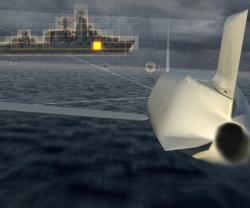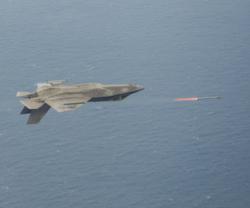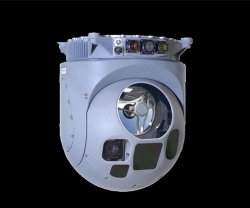Lockheed Receives U.S. Air Force Contract for 3rd & 4th GPS III
17.01.2012 North America
The U.S. Air Force has awarded Lockheed Martin a $238 million contract for production of the 3rd and 4th satellites in the next-generation Global Positioning System (GPS) constellation, known as GPS III. The acquisition of the next 2 GPS III satellites at one time will allow the Lockheed Martin-led team to maximize efficiencies in satellite manufacturing.
The GPS III program will affordably replace aging GPS satellites while improving capability to meet the evolving needs of military, commercial and civilian users worldwide. GPS III satellites will deliver better accuracy and improved anti-jamming power while enhancing the spacecraft's design life and adding a new civil signal designed to be interoperable with international global navigation satellite systems.
"GPS is a global gold standard, providing accurate, reliable, continuous, free worldwide positioning, navigation and timing (PNT) services," said Col Bernie Gruber, Director of the U.S. Air Force's Global Positioning Systems Directorate. "And we are focused on delivering world-class space-based PNT capabilities to our users around the world. As the need for more capability increases, GPS III will allow us to affordably sustain and modernize the constellation by providing increased capabilities incrementally to better meet current and future needs."
In May 2008, the Air Force awarded Lockheed Martin an initial contract to design, develop and build the first two GPS III satellites. The contract also includes options for up to 10 additional spacecraft. With the most recent award, the GPS III team is now on contract to deliver four GPS III space vehicles, with the first launch scheduled in 2014. The Air Force has plans to build up to 32 GPS III satellites.
"The government has mapped an extremely sensible acquisition strategy for GPS III and we are focusing on executing the program to deliver these much needed capabilities to billions of users around the word," said Mark Valerio, Vice President and General Manager of Lockheed Martin's Surveillance and Navigation Systems line of business. "As we produce more GPS III satellites, we aim to continually reduce the cost and cycle time of each space vehicle to ensure we deliver the greatest value to the Air Force."
The GPS III program continues to achieve major milestones and the first space vehicle is progressing on schedule. Lockheed Martin received the core structure for the first GPS III satellite at its Stennis, Miss., facility in August, and is now integrating the space vehicle's flight propulsion subsystem. The integrated core propulsion module will be shipped to Lockheed Martin's GPS Processing Facility (GPF) in the summer of 2012 and will then undergo final assembly, integration and test in order to meet its planned 2014 launch.
For GPS III, Lockheed Martin is building on its proven record of delivering highly reliable GPS spacecraft. The fleet of Lockheed Martin-built GPS IIR and IIR-M satellites makes up the majority of the operational GPS constellation. The satellites have exceeded 140 cumulative operational years on-orbit with a reliability record of better than 99.9 percent. Lockheed Martin heritage programs date back to the production of the Oscar and Nova satellites, the programs that paved the way to the current GPS system.
The GPS III team is led by the Global Positioning Systems Directorate at the U.S. Air Force Space and Missile Systems Center. Lockheed Martin is the GPS III prime contractor with teammates ITT Exelis, General Dynamics, Infinity Systems Engineering, Honeywell, ATK and other subcontractors.
Air Force Space Command's 2nd Space Operations Squadron (2SOPS), based atSchriever Air Force Base, Colorado, manages and operates the GPS constellation for both civil and military users.
The GPS III program will affordably replace aging GPS satellites while improving capability to meet the evolving needs of military, commercial and civilian users worldwide. GPS III satellites will deliver better accuracy and improved anti-jamming power while enhancing the spacecraft's design life and adding a new civil signal designed to be interoperable with international global navigation satellite systems.
"GPS is a global gold standard, providing accurate, reliable, continuous, free worldwide positioning, navigation and timing (PNT) services," said Col Bernie Gruber, Director of the U.S. Air Force's Global Positioning Systems Directorate. "And we are focused on delivering world-class space-based PNT capabilities to our users around the world. As the need for more capability increases, GPS III will allow us to affordably sustain and modernize the constellation by providing increased capabilities incrementally to better meet current and future needs."
In May 2008, the Air Force awarded Lockheed Martin an initial contract to design, develop and build the first two GPS III satellites. The contract also includes options for up to 10 additional spacecraft. With the most recent award, the GPS III team is now on contract to deliver four GPS III space vehicles, with the first launch scheduled in 2014. The Air Force has plans to build up to 32 GPS III satellites.
"The government has mapped an extremely sensible acquisition strategy for GPS III and we are focusing on executing the program to deliver these much needed capabilities to billions of users around the word," said Mark Valerio, Vice President and General Manager of Lockheed Martin's Surveillance and Navigation Systems line of business. "As we produce more GPS III satellites, we aim to continually reduce the cost and cycle time of each space vehicle to ensure we deliver the greatest value to the Air Force."
The GPS III program continues to achieve major milestones and the first space vehicle is progressing on schedule. Lockheed Martin received the core structure for the first GPS III satellite at its Stennis, Miss., facility in August, and is now integrating the space vehicle's flight propulsion subsystem. The integrated core propulsion module will be shipped to Lockheed Martin's GPS Processing Facility (GPF) in the summer of 2012 and will then undergo final assembly, integration and test in order to meet its planned 2014 launch.
For GPS III, Lockheed Martin is building on its proven record of delivering highly reliable GPS spacecraft. The fleet of Lockheed Martin-built GPS IIR and IIR-M satellites makes up the majority of the operational GPS constellation. The satellites have exceeded 140 cumulative operational years on-orbit with a reliability record of better than 99.9 percent. Lockheed Martin heritage programs date back to the production of the Oscar and Nova satellites, the programs that paved the way to the current GPS system.
The GPS III team is led by the Global Positioning Systems Directorate at the U.S. Air Force Space and Missile Systems Center. Lockheed Martin is the GPS III prime contractor with teammates ITT Exelis, General Dynamics, Infinity Systems Engineering, Honeywell, ATK and other subcontractors.
Air Force Space Command's 2nd Space Operations Squadron (2SOPS), based atSchriever Air Force Base, Colorado, manages and operates the GPS constellation for both civil and military users.
Latest news
Latest events
Paris Air Show
16 - 22 Jun 2025Paris Le Bourget - FranceDefenPol China2025 - 7th Guangzhou International Defense & Police Exhibition & Summit
11 - 12 Jul 2025Nan Fung International Convention & Exhibition Center (NICEC) - ChinaIDEF 2025 Turkey - International Defence Industry Fair
22 - 27 Jul 2025Istanbul Expo Center - TurkeyDSEI 2025
09 - 12 Sep 2025Excel, London - United Kingdom






















